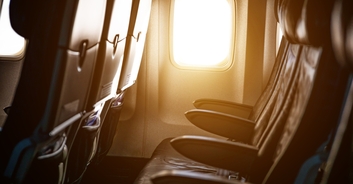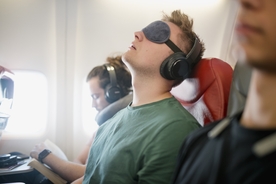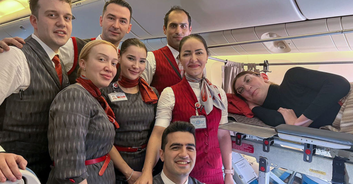As you might have noticed, human beings weren't really designed to fly. We don't have wings, can't deal with air pressure at high altitudes and we tend to prefer to be as close to sea level as possible. But, since we are able to travel by airplane, we can, and do, take to the skies.
However, while we may love a bit of air travel, it can often have some negative effects.
Dr. Steve Iley, the Medical Director for Bupa, has shared some of the most common problems caused by flying - and also some ways of dealing with/preventing them.
1. Back PainNo matter where you are, sitting down for long periods of time with a bad posture can lead to back problems. But, if you keep yourself in the correct position, you can avoid any longterm damage. "Try to sit back, with your shoulders straight back rather than rounded and with both feet flat on the floor," says Dr. Iley. "Avoid crossing your legs or twisting your spine." Moreover, if you are able to, try to move around at least once an hour on a flight. Walking up and down the aisle or doing some stretches can make a huge difference.
2. Nausea"The reduction in air pressure on a flight may cause you to feel dizzy, nauseous or have a headache. Plus, the air in the cabin is recycled and lacks moisture, making you feel more dehydrated than normal," the doctor explains. If you get travel sick, you can pick up some things to help at the pharmacy; and carrying some hand sanitizer/washing your hands regularly will help to ensure that you don't pick up any bugs.
3. Deep Vein ThrombosisDVT is a fairly serious condition that can affect people - most often older individuals or pregnant women - while traveling or sitting still for long periods of time. It causes pain and swelling in the legs and, if left untreated, could cause a pulmonary embolism. "To prevent excess swelling in your feet, make sure to keep moving ... If this isn’t possible, move your feet up and down and side to side," recommends Dr. Iley. "Wearing comfortable footwear that's easy to slip on and off can help you to stay comfy if swelling occurs, and if you have poor circulation consider using flight socks."
4. Bloating"The drop in cabin pressure at altitude can cause the gases in your stomach to expand, leaving you feeling bloated and uncomfortable," says the doctor. If you want to avoid this, try not to consume any fizzy drinks before boarding and steer clear of foods that you know cause excess gas. Drinking lots of water or peppermint tea can also help reduce bloating.
5. Jet LagDepending on the journey you're taking, jet lag might seem like an inevitability. However, its effects can be fairly serious (memory problems, constipation, indigestion), so it's important to do all you can to avoid it. "Staying hydrated is essential to decreasing the effects of jet lag, so drink plenty of water," says Dr. Iley. "Try to adjust these to your destination as quickly as possible helps minimise jet lag - getting some sleep may help."
6. Increased drunkenness"It’s not as much fun, but avoid or limit your alcohol consumption on an aeroplane. Because of the low pressure and dry air in the cabin, you may feel more intoxicated than usual," the doctor explains. Plus, with the prices they charge on flights, you'll be saving your wallet some damage too.
So, if you're planning on a long-haul flight anytime soon, make note. Unfortunately, we don't have anything to recommend for that screaming kid two rows behind you. Maybe pack some earplugs, just in case.



.jpg_ekMAXQ?tr=h-184)
.jpg_WaQeo7?tr=h-184)
